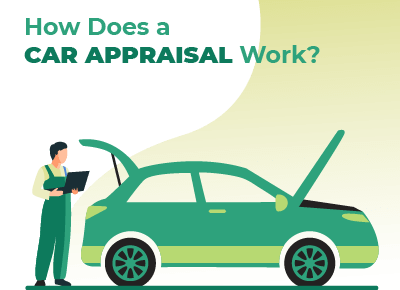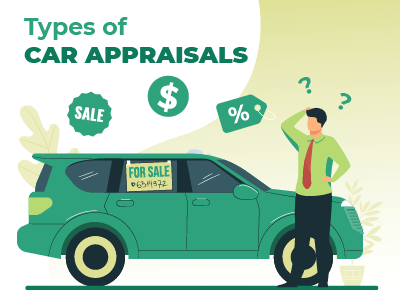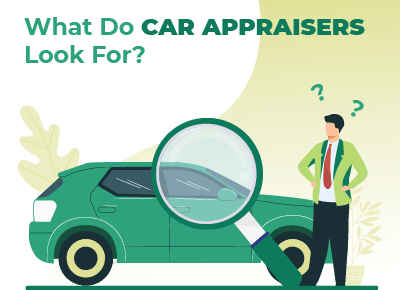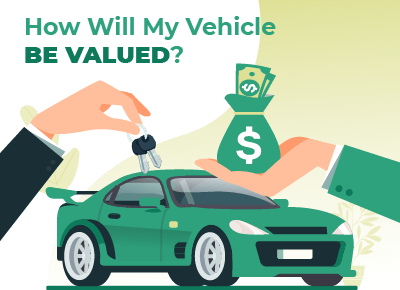How Does a Car Appraisal Work?
May 11, 2021


I am a serial entrepreneur and a consumer advocate. When I’m not helping car buyers, I love working on ventures that have a positive impact.
I run a cause marketing agency and serve on the board of Vayu Global Health where we are disrupting the medical industry and preventing the needless deaths of mothers and babies during childbirth.
You want to make sure that your vehicle looks its best before its appraisal.
But what exactly do car appraisers look for when determining the value of your vehicle?
Here's what you need to know about car appraisals and how the value of your car or trade-in is valued.
Table of Contents
What Is a Car Appraisal?
A car appraisal is the process of assessing the value of a vehicle by a qualified appraiser. It involves a thorough inspection and evaluation of the vehicle's condition, features, mileage, and history. The purpose of a car appraisal is to determine the fair market value of the vehicle for various purposes such as trade-ins, loans, insurance, or private sales. During a car appraisal, the appraiser performs several key steps.
They start with a visual inspection and walkaround, looking for any damages, signs of accidents, or wear. They also check the vehicle's paperwork, including registration, maintenance records, and accident history. The appraiser examines the vehicle's exterior and interior, inspecting the doors, trunk, hood, and electronic components. They also look under the hood to check the fluid levels. A test drive is conducted to evaluate the engine performance, shifting quality, acceleration, handling, and braking. The appraiser may drive the vehicle for a few miles and check for any leaks.
After completing the appraisal, the dealership manager calculates the vehicle's value based on its condition, performance, and the "Black Book" value. The vehicle can be valued at either retail or wholesale, depending on its condition. Retail value means the vehicle is in good condition and can be resold at the dealership. The wholesale value indicates the vehicle is not in good enough condition for quick resale, and it may be sold at a wholesale auction.
Here’s a look at some of the most common types:
Types of Car Appraisals
 Dealership Appraisal. When you trade in your vehicle, your vehicle will receive a dealership appraisal.
Dealership Appraisal. When you trade in your vehicle, your vehicle will receive a dealership appraisal.- Lender Appraisal. A lender appraisal takes place when you are looking to get a loan on a vehicle purchase. The lender may send an appraiser to assess the value of the vehicle.
- Independent Private Appraisal. If you are involved in a private vehicle transaction as either a purchaser or seller, you or the buyer may want to have an independent private appraisal. This is a process where an independent appraisal inspects the vehicle and assigns a value.
- Guidebook Appraisal. You can perform your own appraisal using a guidebook like Kelly Blue Book to get an estimated value for your vehicle. A guidebook appraisal is recommended so you can get a good “ballpark” idea of what your vehicle is worth.
 The Role of the Appraiser
The Role of the Appraiser
The appraiser is tasked with assigning a value to the vehicle. The appraiser will go through a complete checklist of the vehicle. This includes everything from a visual inspection of the exterior to examining the vehicle’s paperwork, odometer, and interior components. The appraiser will also conduct a test drive and calculate the value of the vehicle.
What Do Car Appraisers Look For?
It’s important to know what car appraisers look for during their inspection. Here is what to expect:
 Initial Visual Inspection and Walkaround
Initial Visual Inspection and Walkaround
The appraiser will walk around the vehicle first and look for any damages, including cracks, dents, signs of accidents, and signs of wear. They will also look at the condition of the tires. This visual inspection of the vehicle is known as a “silent walkaround” that provides a first impression of the vehicle’s condition.
Check Vehicle's Paperwork, Mileage, & VIN Verification
The vehicle’s tags, registration, maintenance records, or any accident paperwork are checked. Afterward, the appraiser will check the vehicle’s VIN against a vehicle history search service. This is to check for any history of accidents and vehicle ownership history. Afterward, the appraiser will check the mileage on the odometer.
Look at the Vehicle's Exterior & Interior
The vehicle’s doors, trunk, and hood are checked to see if they open and close smoothly. Afterward, the appraiser will go inside the vehicle and check the various electronic components. At this time, the appraiser will check to see if all the lights, knobs, and buttons are working properly.
Look Under the Hood
After checking the vehicle's interior, the appraiser will take a look at the fluid levels on the vehicle. This includes an inspection of the oil, coolant, brake fluid, transmission fluid, and washer fluid.
Drive Test Is Conducted
The appraiser will conduct a driving test and check how the engine starts, the quality of the shifting, acceleration, handling, and braking. The appraiser will typically drive the vehicle for about 3 to 5 miles. After the driving test is complete, the appraiser will check for any leaks under the vehicle.
Final Calculation of Vehicle's Value
After the appraisal is completed, the dealership manager will calculate the vehicle's value based on its condition, driving performance, and “Black Book” value of the vehicle.
Will My Vehicle Be Valued at Retail or Wholesale?
 During the appraisal, a value will be given to your car based on its condition. Your vehicle will fall into one of two categories: Retail and wholesale.
During the appraisal, a value will be given to your car based on its condition. Your vehicle will fall into one of two categories: Retail and wholesale.
- With a retail value, the vehicle will be resold at the dealership. That’s because the vehicle is considered to be in good condition and can be resold quickly.
- With a wholesale, the vehicle will be sold at a wholesale auction. That’s because the vehicle is considered to not be in good enough condition to be sold quickly. The vehicle may also be sold at wholesale if it is not considered to be in high demand in the local market.
If the dealer can sell the vehicle at the dealership, they are likely to experience a higher profit. That is because they will have the opportunity to add extra revenue to the vehicle from financing and dealer add-ons.
If the dealer sells the vehicle at a wholesale auction, they get an auction value. If the dealership has to sell the vehicle wholesale, they are most likely to simply “break-even” on the vehicle.
How Does a Dealer Decide to Value Your Vehicle?
If the dealer believes that they can sell your vehicle at the dealership, they will assign a retail trade-in value. If the dealer believes that they will not quickly sell the vehicle at the dealership, they will assign a wholesale value for your vehicle.
Best 0% APR Deals by Category
Frequently Asked Questions
What does the car appraiser look for?
An appraiser will look for visible damage, mileage, vehicle history, damage to the electronics, fluid levels, and drive quality.
How long does it take to appraise a car?
A typical vehicle appraisal should take less than an hour. Exotic cars can take longer to appraise.
How do I find the value of my car?
You can check the value of your vehicle with online resources Kelly Blue Book or Hagerty.
What is the difference between Black Book and Blue Book value?
Black Book is what dealerships use to value a vehicle. Kelly Blue Book is what consumers use to value their vehicles. Black Book tends to use more metrics to value a vehicle.
What should I do before trading in my car?
Be sure to check the value of your vehicle with Kelly Blue Book. Also, clean the vehicle, make minor repairs, and get all of the vehicle’s paperwork in order.
Posted in Car Buying Tips, Car Trade-In & Sell |




